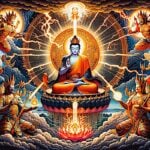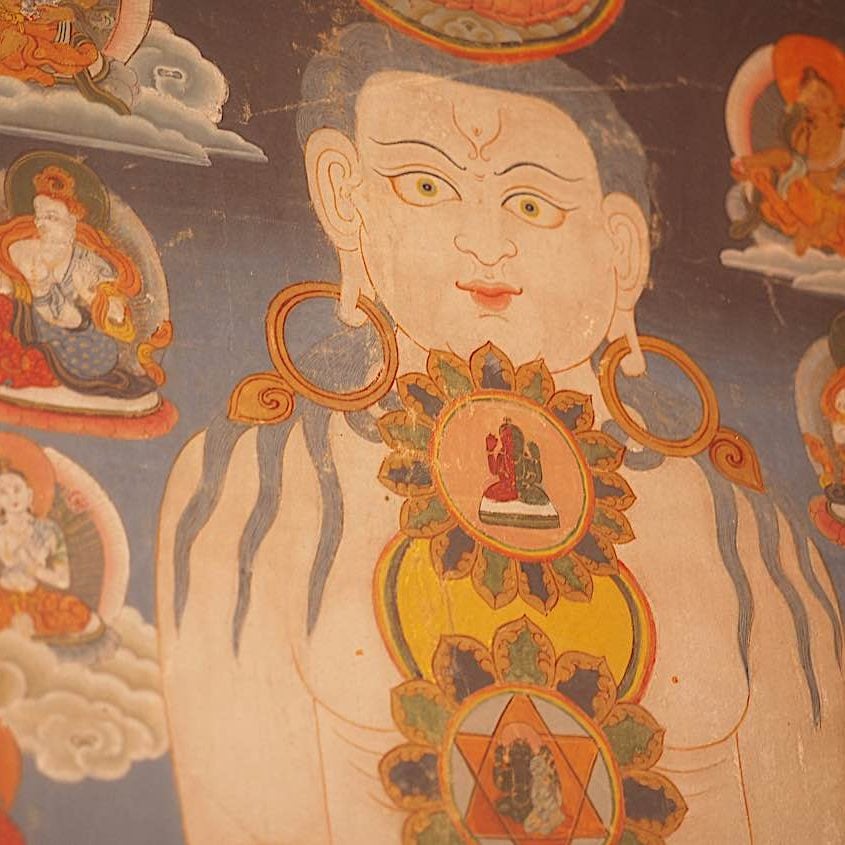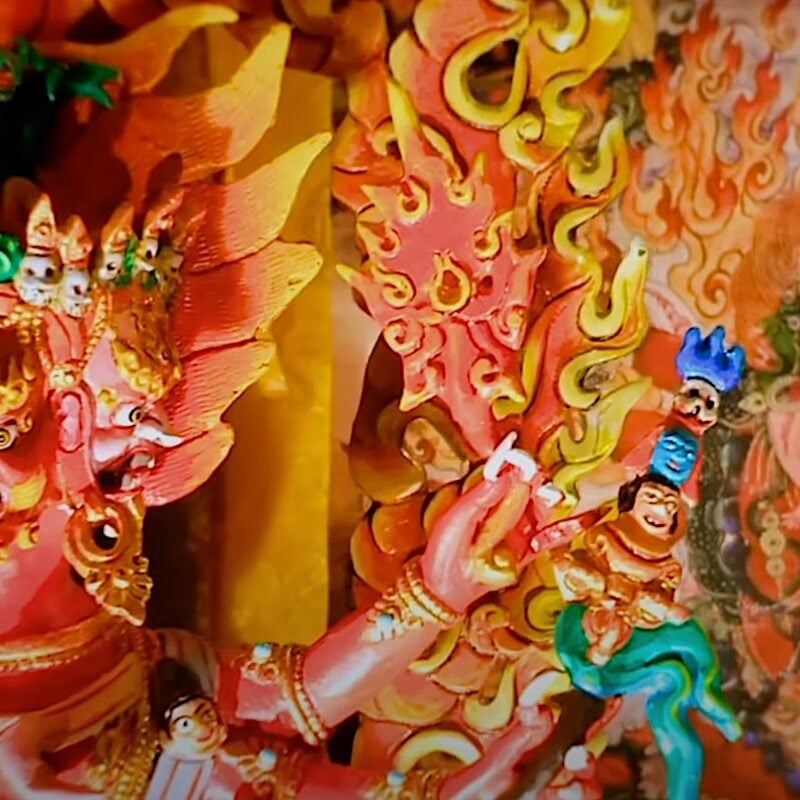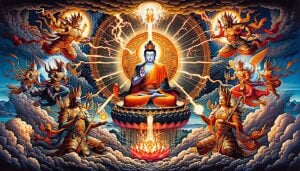Shabkar “the greatest yogi after Milarepa” (Dalai Lama) becomes the object of his disciples attachment — from his autobiography
Among the most loved of the sages from the land of Tibet was the great Shabkar. His Holiness the Dalai Lama explained Shabkar’s unique appeal in the forward to the book the Life of Shabkar:
“Regarded by many as the greatest yogi after Milarepa to gain enlightenment in one lifetime, he also lived the life of a wandering mendicant teaching by means of spiritual songs. Shabkar is particularly celebrated for the absolute purity of his approach to his lama and his personal practice, which freed him from the snare of sectarianism. He is also affectionately remembered for the kindness of his gently teasing humor.”
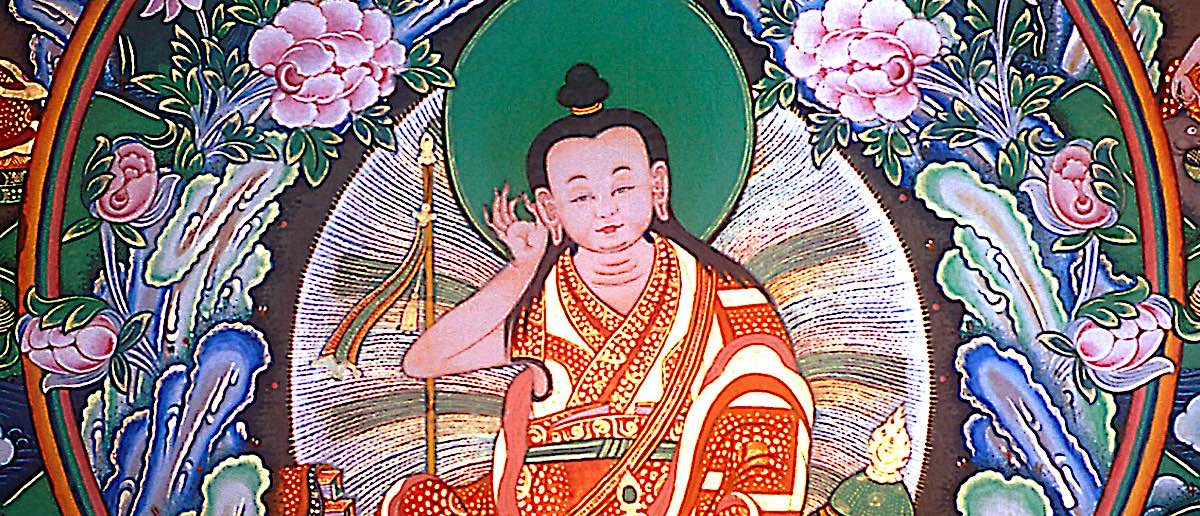
Shabkar and emanation of Milarepa
Shabkar, considered an emanation of Milarepa, also taught in songs and much of his life in solitude in the mountains. He is immediately relatable, as he received teachings and initiations from gurus of all schools of Buddhism, although his principal root guru was Chogyal Ngakgi Wangpo — who was not only a Mongolian king, but also the prized disciple of the First Doprupchen. One of his main Yidams was Hayagriva, a practice given by his root guru. [For a story on great Hayagriva, see>>]
Shabkar tries to leave his disciples
One of the most exquisite exchanges between Enlightened teacher and his disciples is recorded in Shabkar’s wonderful biography, The Life of Shabkar: Autobiography of a Tibetan Yogin.
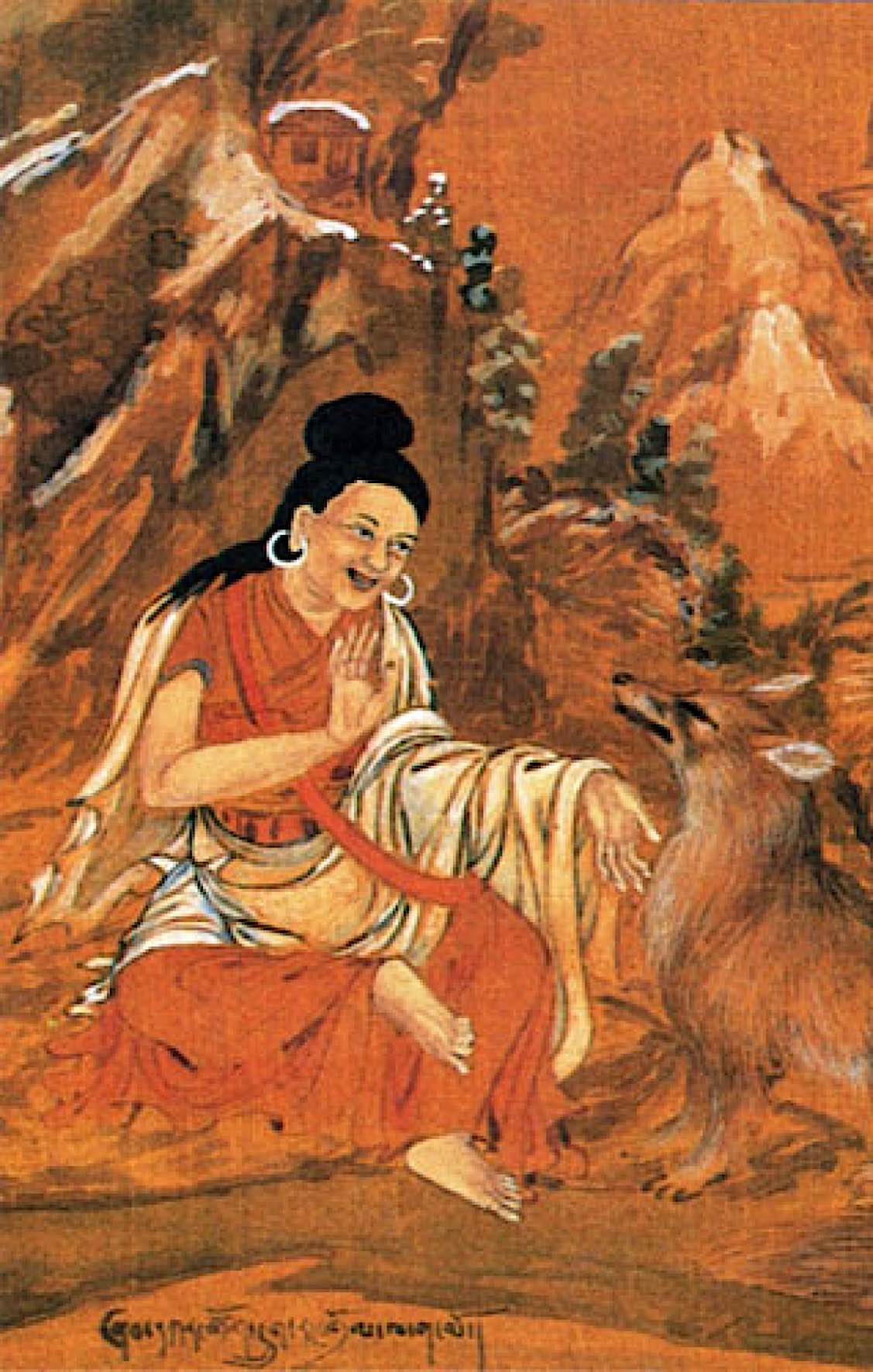
This is a long and poignant and profound book, a teaching, and equally beautiful in English translation. Like Milarepa, Shabkar was famous for his songs. Many great accomplished masters in Tibet taught in verse and song, but none more beautifully than Shabkar.
One striking scene in this lovely — and highly recommended — book, is when he was trying t leave his students — to move on after three years to teach others. The exchange between students — unable to part with their guru — and the master, who was anxious to move on is incredibly beautiful here. It evokes the sense of angst we modern students have whenever our guru moves on to teach others. We selfishly cling. Instead, the great Shabkar explains:
“In the past, holy beings never stayed in one place for more than one or two years. This was not because they were unable to remain, it was for the exalted purpose of benefiting themselves and others. I have been in this excellent place three years now. I have taught you whatever I know, without keeping anything back.”
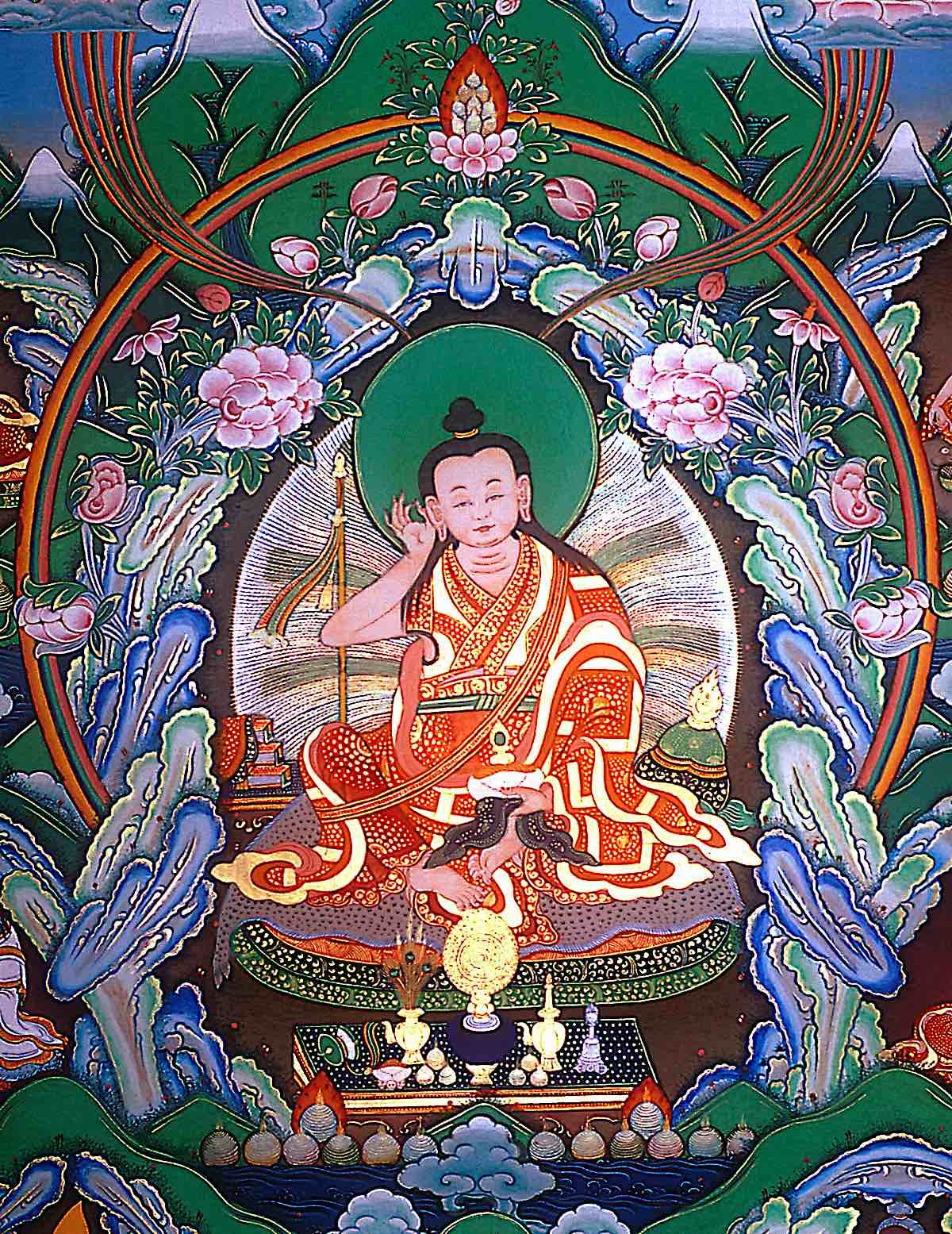
But they continued to cling, Shabkar gave them his final advice:
I answered, “Sons, have you thought well about birth and death, about the defects of samsara? Have you given up attachment to this life? If you strongly aspire to the state of liberation and complete omniscience and decide to practice Dharma genuinely, this what you should do:
“Leave your mind to the Dharma; leave your Dharma to a beggar’s life; live your beggar’s life until death; leave your death to a cave. These are ‘four ultimate aims’
“Cast yourself out from your place among men and take your place among dogs, and you shall find a place among celestial beings. These three are known as ‘casting oneself out, taking, and finding’.
“Start with the vajra of unswerving determination, end with the vajra of indifference to what others may think of you, and, at all times, keep with you the vajra of wisdom. These are the three ‘diamond-hard resolutions’.
“Altogether, these ten are known as the ‘ten cardinal treasures of the past saints’.
“Faith, generosity, discipline, learning, modesty, sense of shame, and insight: these are the ‘seven riches of the noble ones’.
“Simple food, simple clothing, simple dwelling place, simple possessions: these are the ‘four preferences of the noble ones’.
“Not returning anger for anger, insult for insult, slander for slander, blow for blow: these are the ‘four Dharmas of training in virtue’.
“If you follow these, wherever you may go, you will succeed in the Dharma. Furthermore, to sever all ties and attachments, when you are wandering without preference through different countries you should do this:
When you wander from place to place,
Traveling at will throughout many regions,
Visualize your root guru on the crown of your head
And, in sadness or happiness, pray to him.
When you’ve found food and clothes and Dharma—
Establishing your well-being,
That is the compassion of the guru.
When you face hardships,
It is your residual karma That has made you needy.
Even if you are lacking food and clothing,
Don’t behave in evil, shameless ways.
When you beg for alms and people give you nothing,
Don’t say harsh, angry things.
Wherever you are happy, make that place your homeland.
Rely on whoever is kind to you as if he or she were your parent.
Even if you have nothing material to offer,
When you see symbols of the enlightened body, speech, and mind,
Offer prostrations and circumambulations.
When you meet a good lama,
Even if you have no present to offer,
Ask him to give you a blessing with his hand.
Beware of bandits, thieves, and dogs:
They may harm your body and life.
Avoid meat, wine, women, garlic, and onions;
These are poison for practitioners.
To stay in towns or monasteries is very comfortable,
But if you linger there, attachment and hatred will increase.
A Dharma practitioner’s place is a mountain hermitage;
Always remain in the wilderness.
When you see suffering and poverty,
Be compassionate; try to help.
When you perceive faults in others,
Think, “This is my own fault,”
And train in pure perception.
Life is short; Death constantly confronts us:
Don’t bother wondering if you’ll have enough food
To eat tomorrow or the day after.
If you don’t die, and if you seek it out,
You’ll find the illusory wealth for what is needed—
But even if you did not find what you sought,
And you were to die of hunger,
Your next rebirth would be excellent,
Since your death had come to pass
From having sought to practice the Dharma.
Always be even-minded about death:
To die practicing Dharma is the best way to die.
In conclusion, don’t think too much;
Practice according to your master’s instructions;
Don’t be lazy or indifferent: Have enthusiastic diligence.
…
After more than two years had passed in this great sacred place, I often talked to my disciples about leaving, and one day I sang this song:
In a small willow grove
The cuckoo flies happily here and there.
But once he gets entangled in a net,
He regrets his carelessness.
Now he severs his ties to the willow grove
And, freed, flies back into the heavens.
The cuckoo makes his way through the blue sky—
The place where the white vulture soars.
In the cool shallow waters,
The fish swims happily here and there.
But once he is caught on a steel-blue hook,
He regrets his carelessness.
Now he breaks out from shallow water,
And swims comfortably in the pure depths.
The fish makes his way to the ocean—
The playground of the great whales.
In the quiet mountain retreat,
The yogin lives happily amid his disciples,
But once he is caught by the Lord of Death
He will regret his heedlessness.
Now, breaking the ties to this life,
Traveling here and there to pleasant regions
He will make his way to other solitudes
Where past sages once stayed.
Realizing that I was thinking of leaving, Rabgye and other disciples presented many reasons why I should stay one or two more years to help them, and offered this song:
You are the fire-crystal, the sun,
Born in the land beyond the ocean.
Because you dispel the darkness of the four continents,
The beings here are happy;
The wild flowers of this meadow
Will sadden without you.
Please remain in the azure heights,
Continuing to illuminate us.
You are the white snow lioness of the glaciers,
Born in the high snow ranges.
Because you rule over the savage beasts,
All other animals are joyful;
The place where snow lions toss their turquoise manes.
Roaming at random from place to place,
The yogin longed for the solitude of the wild mountains.
Forsaking his wanderings,
He made his way to this sublime sacred place—
The place where yogins practice meditation.
Pleased with this, the disciples made offerings and held a fine ganachakra feast.
At the end of it they sang this joyful song:
The fragrant lotus flower
Gives off a most delicious scent,
Even seeming content to do so;
It unfolds itself petal by petal.
Striped like small tigers,
Humming our contentment,
We bees fly easily through space In joyful celebration of the lotus flower.
The dark and cool southern cloud Lets fall a gentle rain,
Even seeming content to do so,
It unfolds its varied transformations.
Fanning out ocellated iridescent feathers,
We peacocks arrange ourselves on the solid earth;
In joyful celebration of the thunder dragon
We dance in our contentment.
The authentic root guru,
Has given profound instructions,
And even seems to enjoy doing so.
His mind replete with the Dharma.
We, his fortunate disciples,
Prepare an excellent mansion
To hold a feast with song and dance
In joyful celebration of these teachings.
Jigme Gyaltsen and a few other disciples said: “Today we are indeed fortunate. Precious lama, to benefit our minds, please sing a song of spiritual advice, and a short song in praise of this sacred mountain and the two lakes.”
I sang this song:
Here is Manasarovar, the great turquoise lake,
The fountainhead of the four great rivers.
Here dwells the naga king,
The Lord who bestows upon this land
Prosperity and auspiciousness.
Here is the Vulture Peak, Kailash, T
he center of the world,
Where people of four human races come and go.
Here dwells the Buddha himself,
The lord who turns the Wheel of Dharma
For the sake of sentient beings.
The wish-granting jewel
Comes from a distant ocean.
To free all beings from poverty.
It is now set at the pinnacle of the victory banner
And rains down all our needs: Whoever has a wish, come and fulfill it!
The renunciate Tsogdruk Rangdrol,
Was born in Domey,
Yet to benefit the Dharma and sentient beings,
From the slopes of the Snow Mountain
He now showers whatever Dharma one might wish for:
Whoever has an interest, come and listen.
The fragrant, exquisite lotus flower,
Will one day be spoiled by frost,
Its stalk will be wilted, its petals left behind.
Now, while it is still splendid and vivid,
Fortunate bees, gather up the sweet nectar!
This human body, complete with its freedoms and endowments,
Will one day be vanquished by death;
Its flesh and bone will decompose.
Now, fortunate disciples, while you are young,
Meditate according to the vast and profound instructions!
Although the fire-crystal sun itself is burning hot,
When that very sun comes up, Its coming is a boon to the waterfowl.
When they go to swim upon the lotus lake,
Calling out sweetly, they are perfectly content.
Look at them, playful, almost dancing In the fresh lotus-leaf groves.
Hard circumstances may well occur,
Yet they can come as boons for practitioners.
When practitioners meditate on Bodhicitta,
And traverse the paths and stages,
They are perfectly content.
Look at them, in mountain solitudes,
Seeking to tame their minds!
Palace of Chakrasamvara
Abode of five hundred arhats,
Celestial land of dakas and dakinis,
Seat of the siddhas of the past,
Center of this Jambudvipa world—
Here is Kailash, the White Mountain!
Completing a single circumambulation
Of this great sacred place
Will purify the evil actions of one’s entire life.
Palace of the eight great nagas,
Playground of mamos and dakinis,
Gathering place of the gods who take delight in virtue,
Growing place of the Rose-apple Tree,
Source of the four great rivers—
Here is the turquoise lake, Manasarovar!
Just bathing here or drinking the water
Will purify negative actions and the obscuring emotions.
Make offerings here, do prostrations;
Circumambulate this glacial lake, faithful ones!
It will purify your bad karma, unwholesome deeds, and obscurations,
And you will reap blessings and accomplishments.
After I sang this, they prostrated themselves with fervent devotion, offered many words of gratitude, and returned to their hermitages. Almost three years had passed since I had come. I said to all my disciples
“In the past, holy beings never stayed in one place for more than one or two years. This was not because they were unable to remain, it was for the exalted purpose of benefiting themselves and others. I have been in this excellent place three years now. I have taught you whatever I know, without keeping anything back. If you practice, you will be able to accomplish your aims.
“Owing to your kindness, disciples and patrons, in these three years, I, too, was able to complete my retreat, thus benefiting myself. Benefit for both self and others having been accomplished, it would be best if we parted now in such excellent circumstances and mutual satisfaction. Now, it is time to go: there is no point in trying to delay my departure.” I explained to them at length why there was no reason to try to dissuade me from leaving, and at the end I sang this song:
Once the proper number of days has passed
No one can keep the moon From moving on to other continents.
Powerful mantradharas, now it is your task
To guard the garden of white lotuses
From the threat of hail! Once the cold winds and rains have come,
No one can keep the bees
From moving down into the jungles.
Warm southern clouds, now it is your task
To guard the flowers, the meadow’s ornaments,
From the threat of frost!
Once the time to leave has come,
No one can keep the yogin
From moving on to another place.
Powerful dharmapalas, now it is your task
To guard the assembly of fortunate disciples,
From the threat of disease and evil spirits!
SOURCE
Shabkar Tsogdruk Rangdrol. The Life of Shabkar: Autobiography of a Tibetan Yogin . Shambhala. Kindle Edition.
Image: By Matthieu Ricard – It comes from the photographer/author., CC BY-SA 4.0, https://commons.wikimedia.org/w/index.php?curid=95121139
More articles by this author

Guru Rinpoche is ready to answer and grant wishes: “Repeat this prayer continuously” for the granting of wishes

VIDEO: Vajrapani Vajra Armor Mantra: Supreme Protection of Dorje Godrab Vajrakavaca from Padmasambhava
Search
Latest Features
Please support the "Spread the Dharma" mission as one of our heroic Dharma Supporting Members, or with a one-time donation.
Please Help Support the “Spread the Dharma” Mission!

Be a part of the noble mission as a supporting member or a patron, or a volunteer contributor of content.
The power of Dharma to help sentient beings, in part, lies in ensuring access to Buddha’s precious Dharma — the mission of Buddha Weekly. We can’t do it without you!
A non-profit association since 2007, Buddha Weekly published many feature articles, videos, and, podcasts. Please consider supporting the mission to preserve and “Spread the Dharma." Your support as either a patron or a supporting member helps defray the high costs of producing quality Dharma content. Thank you! Learn more here, or become one of our super karma heroes on Patreon.
Lee Kane
Author | Buddha Weekly
Lee Kane is the editor of Buddha Weekly, since 2007. His main focuses as a writer are mindfulness techniques, meditation, Dharma and Sutra commentaries, Buddhist practices, international perspectives and traditions, Vajrayana, Mahayana, Zen. He also covers various events.
Lee also contributes as a writer to various other online magazines and blogs.






